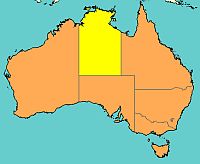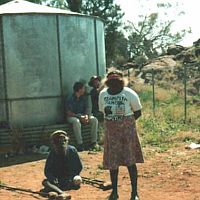- About Us
- Columns
- Letters
- Cartoons
- The Udder Limits
- Archives
- Ezy Reading Archive
- 2024 Cud Archives
- 2023 Cud Archives
- 2022 Cud Archives
- 2021 Cud Archives
- 2020 Cud Archives
- 2015-2019
- 2010-2014
- 2004-2009
 |
Finding ‘Community’ In The Australian Northern Territory |
Someone smarter than me once said that when you see through everything, you end up seeing nothing. This should be remembered as people seek to identify the  'real' motivation for John Howard's recent intervention into Aboriginal communities. It is valid to look for political motivation in any policy initiative but this must come only after the policy has been assessed on its own merits. Cynics must allow for the possibility that a policy is being pursued because it is likely to deliver outcomes.
'real' motivation for John Howard's recent intervention into Aboriginal communities. It is valid to look for political motivation in any policy initiative but this must come only after the policy has been assessed on its own merits. Cynics must allow for the possibility that a policy is being pursued because it is likely to deliver outcomes.
Politicians are supposed to do things to please voters, and that their instincts are sharpened in an election year is no bad thing.
Further those people who say "look, the Howard government has been in for 11 years, why didn't they do something earlier" need to examine their own records. Where this refrain comes from someone  in the Northern Territory (NT) government, someone who was an Aboriginal and Torres Strait Islander Commission (ATSIC) commissioner or employee, someone in NT policing, it has to be said that a bit of self-examination is in order first. An enquiry into ATSIC's conduct is presumably pointless now but it cannot be proud of its record. It did not stop this descent into the abyss.
in the Northern Territory (NT) government, someone who was an Aboriginal and Torres Strait Islander Commission (ATSIC) commissioner or employee, someone in NT policing, it has to be said that a bit of self-examination is in order first. An enquiry into ATSIC's conduct is presumably pointless now but it cannot be proud of its record. It did not stop this descent into the abyss.
As for the idea that Messrs Brough and Howard’s plan should have been conducted in concert with Aboriginal community leaders and Clare Martin's government, can anybody really blame Canberra for giving a wide berth to such proven failures? This initiative may lack subtlety but many aspects of the problem are not subtle. Mindless alcoholism, addiction, venereal diseases in pre-school children, constant violence... a prophylactic solution may only be a start, but one needs to  start somewhere.
start somewhere.
Let's hope that the next phase of debate has the courage to ask what the viability of these communities actually is. If they are characterised by lack of opportunity, by constant fear in women and children, by addiction and violence as the rule and not the exception, with a near total reluctance to testify against the most horrendous crimes imaginable, then in what sense are they "communities"?
If they are not the setting for interdependence through commerce or employment, if there is no common purpose for individuals to contribute to and to draw from, then they are not communities.
I once walked along the main street of the remote settlement of Yuendumu. The garbage in the street was almost ankle deep. There was an item of refuse (empty bottles, cartons, paper, etc) every 20 or 30  centimetres. I walked past a large garbage bin and looked in it and the level of rubbish in the bin was identical to the distribution pattern around it …someone seemed to have put some rubbish in it by mistake!
centimetres. I walked past a large garbage bin and looked in it and the level of rubbish in the bin was identical to the distribution pattern around it …someone seemed to have put some rubbish in it by mistake!
If there is no civic pride as evidence of belonging in the places where Indigenous people live (and litter and vandalism tell you plainly there is not) then these are not communities. Settlements perhaps, gulags maybe. But communities?
I think not.
